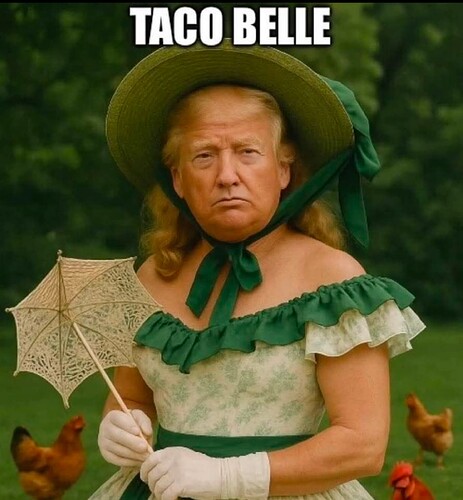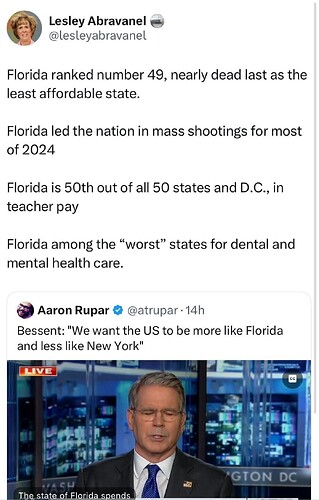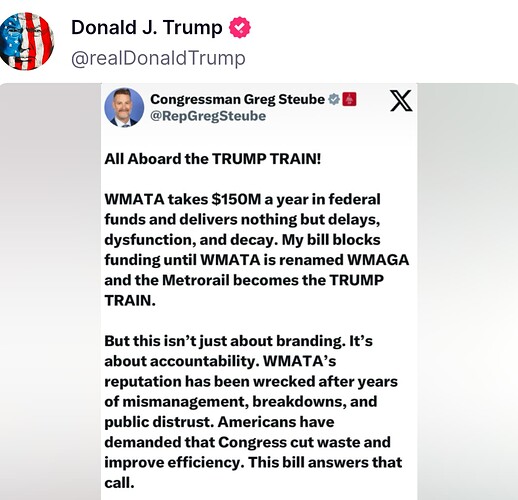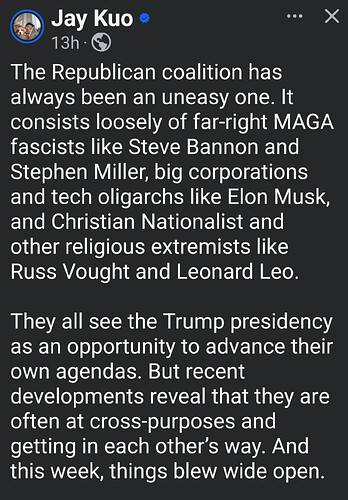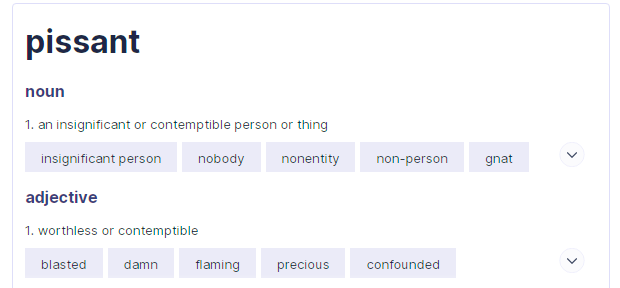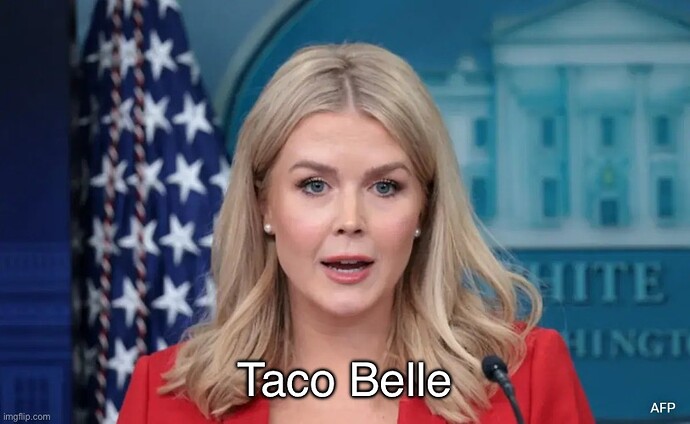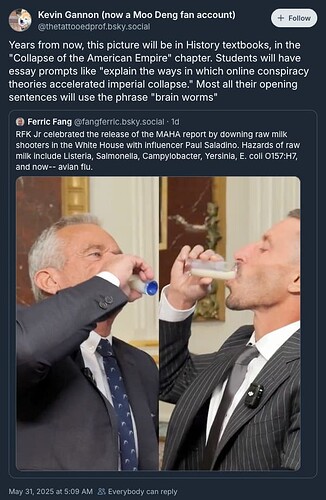‘I was new to Washington, and it was suggested that I use The Federalist Society as a recommending source on Judges. I did so, openly and freely, but then realized that they were under the thumb of a real “sleazebag” named Leonard Leo, a bad person who, in his own way, probably hates America, and obviously has his own separate ambitions. He openly brags how he controls Judges, and even Justices of the United States Supreme Court — I hope that is not so, and don’t believe it is! In any event, Leo left The Federalist Society to do his own “thing.” I am so disappointed in The Federalist Society because of the bad advice they gave me on numerous Judicial Nominations. This is something that cannot be forgotten!’
[See comments for screenshot of post]
Such a public break between Trump and the Federalist Society could create seismic political waves. All of the current sitting right-wing justices are allies of the “sleazebag” Leo and owe their positions in part to him. They still consider themselves diehard Federalist Society members and are aligned with Leo’s religious right agenda—which Trump considers part of Leo’s “separate ambitions.”
As ProPublica noted, Leo
“advised Trump on the nominations of Neil Gorsuch, Brett Kavanaugh and Amy Coney Barrett. Before that, he’d helped pick or confirm the court’s three other conservative justices — Clarence Thomas, John Roberts and Samuel Alito.”
Leo was also largely responsible for the Federalist Society gravy train that Justices Clarence Thomas and Samuel Alto rode for decades. Leo helped organize a salmon fishing weekend in Alaska that included Alito and a hedge fund billionaire and donor. He helped arrange for Scalia and Thomas to attend private Koch Brother donor retreats. The Federalist Society flew Scalia to member meetings in Montana and Napa Valley. And Leo helped Thomas’s wife, Ginni, with the launch of her consulting firm, directing Kellyanne Conway to pay her at least $25,000 as a subcontractor, according to The Washington Post, with no mention of Ginni in the deal, of course.
If Trump can turn so quickly on Leo, he could turn on the justices… and they could turn on him. Reporters could and should begin to ask GOP leaders if they agree with Trump’s assessment of Leo. They should also ask the senators who voted to confirm his picks what they think of Trump’s recent attacks.
**DOGE Musk Go
In another important development and apparent fracture, billionaire Elon Musk, the largest donor to the Trump campaign, officially left the Trump administration this week. But his departure was far from frictionless.
For months, Musk and his DOGE team had choked off government funding and disrupted the federal workforce with their chaotic firings, threats and recoding of computer systems. Musk quickly became one of the most hated people in the country, with negatives even worse than Trump’s.
Despite his efforts in DOGE, Musk has produced only minor actual cost savings to show for it, and the government is still spending more by this time than it did last year. According to the BBC, his promise to cut $2 trillion out of government spending first fell to $1 trillion, then to $160 billion estimated, then $61.5 billion actually itemized, and then only $32.5 billion saved with any back-up receipts to prove it—and even those were highly questionable when compared against actual contracts.
[See comments for graphic]
The rescission bill finally proposed by the Trump White House to formalize DOGE’s actual cuts is for a measly $9 billion, which in the scope of the $1.6 trillion annual federal discretionary budget is a rounding error.
On his way out, Musk took time to criticize Trump’s “Big Beautiful Bill” saying he was “disappointed” and that it undermined his team’s work. “I think a bill can be big or it can be beautiful,” Musk told CBS News, “but I don’t know if it can be both. My personal opinion.”
That criticism comes at an inopportune time for the White House. The Senate is preparing to consider the budget, and deficit hardliners such as Sens. Ron Johnson (R-WI) and Rand Paul (R-KY) have said publicly they will vote against it in its current form because it does not cut enough out of spending. (Just a thought: Perhaps the answer is to not give such huge tax breaks to the wealthy?)
Any Senate changes to the bill will upset the knife’s edge balance that Speaker Mike Johnson achieved among his conference in the House, which passed the budget by a single vote. Further cuts to government services could derail the budget when the amended version is sent back to the House for approval, especially as members in swing districts face pressure from constituents who will lose Medicaid and even Medicare funding under the bill.
**Uncertainty is economic poison
Corporate CEOs are in a state of consternation over the economy, which registered negative growth of -0.2 percent in the first quarter.
While Wall Street initially cheered the news of the ruling of the U.S. Court of International Trade, which deemed most of Trump’s tariffs illegal, the MAGA faction quickly signaled it would fight on and would even find other ways to reimpose high tariffs through other presidential powers.
This has upset corporate leaders, who have been quietly urging Trump to abandon his chaotic ways, reduce tariffs, and bring stability back to trade. Lately, confidence among top CEO has cratered, with the Conference Board reporting on Thursday that it had collapsed during the second quarter at the fastest pace in some 50 years—faster even than occurred during the pandemic. Extended tax breaks are great, say the CEOs, but you still need a healthy economy for business to truly thrive.
[See comments for graphic]
“One of the things that the administration has to offer is a guarantee of certainty with respect to current and potential future tariffs,” National Foreign Trade Council President Jake Colvin said after the Wednesday decision by a trade court. Colvin called the court ruling an “inflection point” that “provides an opportunity for the administration to turn even more towards deal-making.” And as Politico further reported,
‘National Association of Home Builders Chair Buddy Hughes said the “fluidity” of the administration’s tariff policy has harmed housing affordability and that the administration needs to seek deals that will roll back tariff rates. Jonathan Gold of the National Retail Federation said his members need a “rapid resolution” of the tariff process to meet the needs of their customers.’
But Trump appears to be moving in the opposite direction. He is upset at what his new Wall Street nickname of “TACO” (Trump Always Chickens Out) suggests and is lashing out. Trump insisted he will challenge the court’s ruling while also using other statutory authority to impose new tariffs.
And that’s bad news for the economy.
Meanwhile, big funds remain worried Trump’s erratic economic policies, and the ballooning deficit in the GOP budget will push interest rates higher, stifling growth.
**A two-front war?
Assuming Trump continues to pursue an America First agenda, and proceeds to throw his erstwhile allies in the Federal Society and the business world under the bus, MAGA diehards in the administration may quickly find themselves with far fewer allies just when they need them.
This includes needing a Federalist-stacked SCOTUS to continue to sign off on the White House’s “unitary executive” push for even greater executive branch power and for his authority to impose even more arbitrary tariffs. It includes needing big corporate donors to MAGA candidates in the upcoming midterms and the help of senators and representatives who are already in the pockets of these companies.
Trump, of course, isn’t thinking about any of this, focused as he is on grievance, self-aggrandizement, grift and retribution. But a fracture of the uneasy GOP coalition is now a distinct risk, even if Trump is blind to it and is driving the wedges in ever further with his latest attacks.
